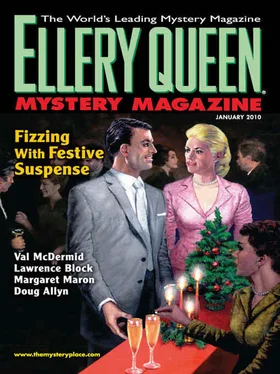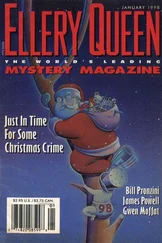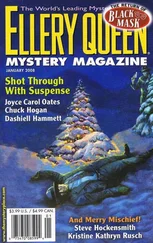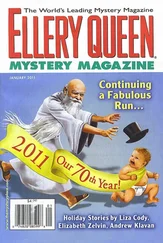Allyn Allyn - Ellery Queen's Mystery Magazine. Vol. 135, No. 1. Whole No. 821, January 2010
Здесь есть возможность читать онлайн «Allyn Allyn - Ellery Queen's Mystery Magazine. Vol. 135, No. 1. Whole No. 821, January 2010» весь текст электронной книги совершенно бесплатно (целиком полную версию без сокращений). В некоторых случаях можно слушать аудио, скачать через торрент в формате fb2 и присутствует краткое содержание. Город: New York, Год выпуска: 2010, Издательство: Dell Magazines, Жанр: Детектив, на английском языке. Описание произведения, (предисловие) а так же отзывы посетителей доступны на портале библиотеки ЛибКат.
- Название:Ellery Queen's Mystery Magazine. Vol. 135, No. 1. Whole No. 821, January 2010
- Автор:
- Издательство:Dell Magazines
- Жанр:
- Год:2010
- Город:New York
- ISBN:нет данных
- Рейтинг книги:5 / 5. Голосов: 1
-
Избранное:Добавить в избранное
- Отзывы:
-
Ваша оценка:
- 100
- 1
- 2
- 3
- 4
- 5
Ellery Queen's Mystery Magazine. Vol. 135, No. 1. Whole No. 821, January 2010: краткое содержание, описание и аннотация
Предлагаем к чтению аннотацию, описание, краткое содержание или предисловие (зависит от того, что написал сам автор книги «Ellery Queen's Mystery Magazine. Vol. 135, No. 1. Whole No. 821, January 2010»). Если вы не нашли необходимую информацию о книге — напишите в комментариях, мы постараемся отыскать её.
Ellery Queen's Mystery Magazine. Vol. 135, No. 1. Whole No. 821, January 2010 — читать онлайн бесплатно полную книгу (весь текст) целиком
Ниже представлен текст книги, разбитый по страницам. Система сохранения места последней прочитанной страницы, позволяет с удобством читать онлайн бесплатно книгу «Ellery Queen's Mystery Magazine. Vol. 135, No. 1. Whole No. 821, January 2010», без необходимости каждый раз заново искать на чём Вы остановились. Поставьте закладку, и сможете в любой момент перейти на страницу, на которой закончили чтение.
Интервал:
Закладка:
Sara laughed. “Oh, Mamma, what a cliché! And anyway, Pappa’s already done that. No, I was thinking late afternoon and sunny, but not too sunny. Autumn, decay, a chill in the air. You know.”
She did. A discussion of shadow ensued, and the infinite difficulty of painting light.
Ursula related tales of her childhood; her daughter listened with real interest. They compared notes about books, films, and favorite meals. But painting was their main topic of conversation, naturally. They liked many of the same artists. Sara herself had shown promise even as a small child. She has far more talent than I ever did, Ursula thought, more discipline, and a better color sense, too.
One afternoon, right in the middle of a debate about Jackson Pollock, came the shock of a beefy hand on her shoulder.
“Ursula? Ursula! Listen to me!”
Focusing on her supervisor’s features was oddly difficult. He looked — dimmed, as though seen through thick glass. She shrugged his hand away and tried to smile. “Yes? What is it?”
The benign face was frowning under its beard in a perplexed way. She noticed Whitney then, slouched a few steps behind him, shifting uneasily from foot to foot and not meeting her eyes.
“Ursula. Let’s go to my office and have a cup of coffee. Whitney’ll spell you.”
“But—”
He took her arm. Ursula almost jerked away. She disliked being touched by strangers. “I’ll be right back, darling,” she murmured. “Wait here.”
The upshot was that her supervisor was worried — no, concerned — about her. Patrons had, well, not complained exactly, but had brought their comments to the front desk. Ursula was obviously tired, she looked as if she hadn’t been sleeping well. She needed a sabbatical, a little rest, with pay. “Just for a few weeks, of course,” he added, stirring his empty coffee cup. “We couldn’t manage long without our most dedicated team member.”
Ursula produced a real smile this time. She had recovered her poise, pushed her panic down with maternal resolve. She’d buy a wig if necessary, and higher-heeled shoes. They couldn’t keep her away from her daughter. No one could.
At least the “sabbatical” gave her more time for research, in between discreet visits to Sara. She found Elif maddeningly circumspect about his private life, with only a few Web sites offering any personal data. He had married young, to another artist, and was now divorced. He had two children. He lived in the country. That was all. His published essays about art history and technique were masterly, but unrevealing of Elif’s own history. The ex-wife’s information was similarly limited.
How discouraging! How could so great and well-known a painter manage to live in such secrecy? These were the moments when Ursula’s shoulders would droop with anxiety and sadness, and she would have to make herself more coffee before she could go on.
No “Sara Elif” to be found on the Web, no prominent Northern European painters named Sara at all, not in the right age range. One afternoon, Ursula’s favorite search engine suggested yet again that she might want to try a different spelling — and this time she discovered that there was a young painter named Sarah Linder (Linderstrom was the name of Elif’s hometown!), whose landscapes were thought very fine. She was only twenty-seven, but surely that was a typo or an error. No mention of her antecedents, which made Ursula nod approvingly. Her daughter, of course, would want to be judged on her own merits.
Two of Sarah Linder’s paintings were in a group show which had just opened a few days before in Brussels; Ursula, trembling with excitement and pleasure, thought this amazing piece of synchronicity a good omen. She printed out the review and Sarah Linder’s The Clearing, and taped them above her computer. The Clearing depicted a rook circling a tree; even reproduced in pixels, Sarah’s handling of the light on the blue-black wings was ravishing. Another dark bird: another nice bit of synchronicity.
Now if she would only hear back from the adoptees’ organization. Perhaps she should write them; e-mail could so easily go astray. Or maybe even telephone very early tomorrow morning? However it came, the news would be good, Ursula assured herself. Soon she’d have a legitimate excuse to start researching airline schedules, too!
All that sitting and clicking and concentrating and coffee had made Ursula restless. She decided to go back to the museum, just for a few minutes before it closed. She wouldn’t bother with the damned wig. No one would notice her; she was an employee, after all.
Half an hour later, she was sitting in front of Ravensara. Judging from that one online example, “Sarah Linder” had been scrupulous about finding her own style, her own palette, but there were certain similarities, too. Ursula walked as close as she dared to the painting to get a better look at the birds.
“Marvelous, is it not?”
She muttered an affirmative.
“She resembles you, a little.”
Lowering her head, Ursula saw that her companion was the art-loving Frenchwoman.
“You think so?”
“Oh yes.” The Frenchwoman was tall, her features large, well proportioned, and now creased in amusement. “Yes. You, but not you. It’s been a long time since I last saw her. She’s much older now.”
Ursula could not speak.
“Have you done your homework? Do you know what ravensara is?” pursued the Frenchwoman.
She shook her head.
“It’s an herb. See it there, the big bush to the left of the fir? Ravensara aromatica. Pretty name, eh, for a disinfectant? It comes from—”
“You know her?” Ursula cut in.
The woman stared back at her proudly, and when she spoke again her accent was stronger, the R’s more pronounced. “Oh, very well indeed! I gave Oskar that photograph when I was twenty, but it took him another twenty-something years to get around to painting me!” She shook her head, still smiling. “Artists! One moment they hate you, the next you’re the beloved and the muse! But how can you not forgive someone who makes you live forever?”
She lifted her strong hands, the thumbs out at right angles, and framed her own face.
“Someone who — What the hell are you doing?” The French accent had vanished.
Ursula didn’t hear the other woman. Her own hands were on the painting’s frame, lifting it from the wall. She was vaguely aware of a mechanized shriek somewhere in the room. How lucky that she had worn her old running shoes! They carried her past a wildly gesticulating guard and into the corridor. She would never have believed she could run so fast, and up stairs at that, and with such a burden. So swift was her flight that the curved walls blurred around her, a globe swimming in light, and only the soft metallic clang underfoot guided her to the middle of the catwalk. She flung her arms forward, opened her hands wide, and let Ravensara soar into space.
Her supervisor was being so kind. For once she didn’t mind his hand on her shoulder. He was talking softly, as a father might, while they walked the endless corridors to his office. Sometimes she caught a phrase or two: “A miracle no one was hurt, a real miracle.” “Destroyed. That lovely painting.” But one word especially. “Why?” he wanted to know. Why?
Why? Ursula tried her best to remember. “The Frenchwoman,” she said at last. “Because the Frenchwoman told me it was she. In the painting. Not Sara. Sara’s gone.”
A tall, lean man rounded the corner just then, about to hurry past them. He stopped abruptly. “A Frenchwoman? Good-looking, fiftyish? Five feet nine?”
She nodded.
“Where did you see her?”
Читать дальшеИнтервал:
Закладка:
Похожие книги на «Ellery Queen's Mystery Magazine. Vol. 135, No. 1. Whole No. 821, January 2010»
Представляем Вашему вниманию похожие книги на «Ellery Queen's Mystery Magazine. Vol. 135, No. 1. Whole No. 821, January 2010» списком для выбора. Мы отобрали схожую по названию и смыслу литературу в надежде предоставить читателям больше вариантов отыскать новые, интересные, ещё непрочитанные произведения.
Обсуждение, отзывы о книге «Ellery Queen's Mystery Magazine. Vol. 135, No. 1. Whole No. 821, January 2010» и просто собственные мнения читателей. Оставьте ваши комментарии, напишите, что Вы думаете о произведении, его смысле или главных героях. Укажите что конкретно понравилось, а что нет, и почему Вы так считаете.












